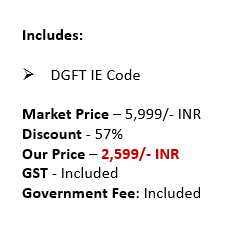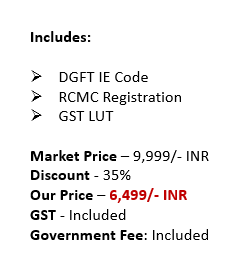import export code (iec)
- New Registration
- Upgrade Registration
Enquire Us
Import Export Code (IEC)
Import Export Code (IEC) is a 10-digit unique identification number issued by the Directorate General of Foreign Trade (DGFT) to Indian entities engaged in international trade. It is also known as an Importer Exporter Code.
The IEC is mandatory for any person or entity involved in importing or exporting goods and services from India. It is a crucial document for clearing customs, opening a foreign bank account, and receiving foreign currency payments.
The IEC is valid for the lifetime of the entity or until it is cancelled or surrendered.
It can be obtained by submitting an online application along with supporting documents and paying the requisite fee. The DGFT issues the IEC within 1-2 working days after verifying the application and documents.
Why some one need Import Export Code (IEC)
An individual or entity engaged in international trade requires an Import Export Code (IEC) for the following reasons:
- Importing or Exporting Goods: IEC is mandatory for any person or entity involved in importing or exporting goods and services from India. It is required for clearing customs and availing benefits under various export promotion schemes.
- Obtaining Export Incentives: To avail of export incentives such as duty drawback, Merchandise Exports from India Scheme (MEIS), Service Exports from India Scheme (SEIS), etc., an IEC is necessary.
- International Payments: To receive foreign currency payments, an IEC is mandatory. This is because banks require an IEC to facilitate international payments.
- Business Expansion: IEC is essential for businesses planning to expand globally. It is required for registering with various international trade organisations and participating in trade fairs and exhibitions.
- Legal Compliance: IEC is a legal requirement for any person or entity involved in international trade. Failing to obtain an IEC can lead to legal consequences and penalties.
An IEC is necessary for anyone looking to engage in international trade, receive foreign currency payments, avail of export incentives, or expand their business globally.
What are the compliances relating to IEC code?
Once an entity obtains an Import Export Code (IEC) from the Directorate General of Foreign Trade (DGFT), it needs to comply with certain regulations and requirements to maintain the validity of the IEC. Some of the compliances relating to IEC code are:
- Updating Information: The entity must keep the DGFT informed of any changes in its registered details, such as address, email, phone number, etc.
- Annual Filing: The entity must file an annual report with the DGFT containing details of its imports and exports during the financial year.
- Surrendering the IEC: If the entity ceases to engage in international trade or cancels its registration, it must surrender the IEC to the DGFT.
- Revalidation: The IEC is valid for the lifetime of the entity or until it is cancelled or surrendered. However, it needs to be revalidated if the entity changes its legal status, such as converting from a proprietorship to a partnership or a private limited company.
- Compliance with Laws and Regulations: The entity must comply with all applicable laws and regulations relating to international trade, such as foreign exchange regulations, customs regulations, and export control laws.
- Record Keeping: The entity must maintain records of all its imports and exports, including invoices, bills of lading, shipping documents, etc., for at least five years from the date of the transaction.
Entities holding an IEC must comply with various regulations and requirements to maintain the validity of the IEC, including updating information, filing annual reports, surrendering the IEC when necessary, revalidating it as required, complying with laws and regulations, and maintaining records of imports and exports.
What Documents are required for Import Export Code (IEC)?
To obtain an Import Export Code (IEC) from the Directorate General of Foreign Trade (DGFT), an applicant needs to submit the following documents:
Identity Proof: Any one of the following identity proofs can be submitted:
- PAN Card
- Passport
- Voter ID Card
- Driving Licence
- Aadhar Card
Address Proof: Any one of the following address proofs can be submitted:
- Voter ID Card
- Driving Licence
- Passport
- Aadhar Card
- Property Tax Receipt
- Electricity Bill
- Telephone Bill
- Bank Certificate (not more than three months old)
Bank Account Details: A cancelled cheque or bank certificate (not more than three months old) with the name of the applicant and the account number.
Digital Signature: A Class II or Class III digital signature certificate is required for online application filing.
Photograph: Two passport-size photographs of the applicant.
Partnership Deed/Incorporation Certificate: For partnerships or companies, a partnership deed or incorporation certificate must be submitted.
In addition to these documents, the applicant may need to submit other supporting documents, depending on the nature of the business, such as:
- Export/Import documents
- Registration certificate with export promotion councils or other organisations
- Sales tax registration
- Factory licence
- Memorandum of Association and Articles of Association
An applicant needs to submit identity proof, address proof, bank account details, digital signature, photograph, and partnership deed/incorporation certificate (for companies/partnerships), along with other supporting documents if required, to obtain an IEC.
How does a File With CA help you out with the Import Export Code (IEC)?
An File With CA (CA) can provide valuable assistance to individuals and businesses in obtaining an Import Export Code (IEC) by providing the following services:
- Eligibility Analysis: The CA can analyse the eligibility of the applicant for IEC and advise on the documents required based on the nature of their business.
- Application Preparation: The CA can assist in preparing and filing the IEC application accurately and correctly, attaching the required documents and submitting the application fee.
- Documentation Support: File With CA can provide guidance and support in preparing and submitting the required documents, such as identity proof, address proof, and bank details, etc. They can ensure that the documents are complete, accurate, and in the prescribed format.
- Follow-up: File With CA can follow up with the Directorate General of Foreign Trade (DGFT) to ensure timely processing of the IEC application and track its status.
- Compliance: Once the IEC is obtained, File With CA can assist in ensuring compliance with the regulations and requirements relating to the IEC, such as annual filings, updating information, and record-keeping.
- Taxation and Accounting Advice: File With CA can provide advice on taxation and accounting implications of international trade, such as foreign exchange regulations, customs regulations, and export control laws.
- Business Planning: File With CA can provide guidance and support in developing a business plan for international trade, including assessing the viability of exporting or importing, identifying potential markets, and developing strategies for market entry.
A File With CA can provide end-to-end assistance in obtaining an IEC, including eligibility analysis, application preparation, documentation support, follow-up, compliance support, taxation and accounting advice, and business planning. This can save time and effort for individuals and businesses and ensure a smooth and hassle-free process.
Related Guides
Documents Required
- Identity Proof
- Address Proof
- Bank Account Details
- Digital Signature
- Photograph
- Partnership Deed/Incorporation Certificate


